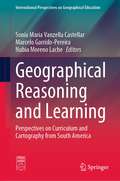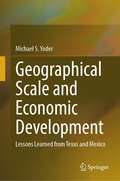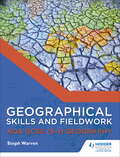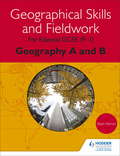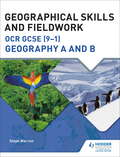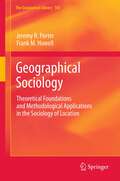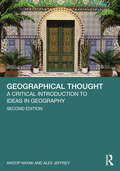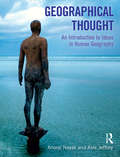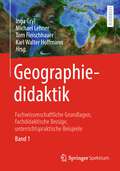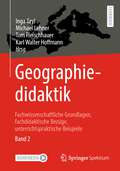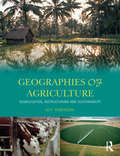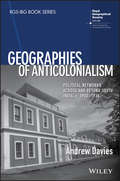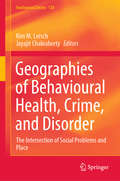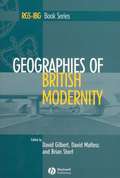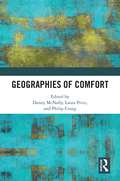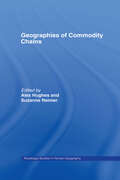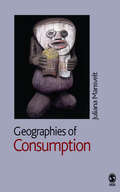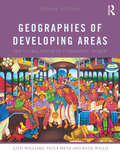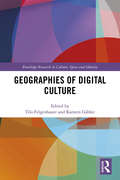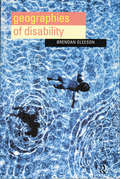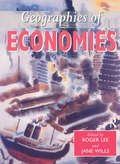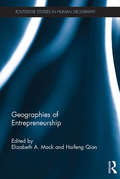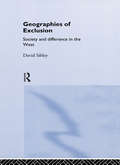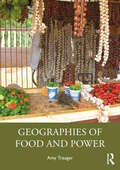- Table View
- List View
Geographical Reasoning and Learning: Perspectives on Curriculum and Cartography from South America (International Perspectives on Geographical Education)
by Sonia Maria Vanzella Castellar Marcelo Garrido-Pereira Nubia Moreno LacheThis book presents the distinctive theoretical and methodological approaches in geography education in South America and more specifically in Brazil, Chile and Colombia. It highlights cartography and maps as essential tools and provides a meaningful approach to learning in geographical education, thereby giving children and young people the opportunity to better understand their situations, contexts and social conditions. The book describes how South American countries organize their scholar curriculum and the ways in which they deal with geography vocabulary and developing fundamental concepts, methodologies, epistemological comprehension on categories, keywords and themes in geography. It also describes its use in teachers’ practices and learning progressions, the use of spatial representations as a potent mean to visualize and solve questions, and harnesses spatial thinking and geographical reasoning development. The book helps to improve teaching and learning practices in primary and secondary education and as such it provides an interesting read for researchers, students, and teachers of geography and social studies.
Geographical Scale and Economic Development: Lessons Learned from Texas and Mexico
by Michael S. YoderThis book is an attempt to bridge the academic discipline of economic geography with the professional field of economic development. Through case studies of economic development, it illustrates two fundamental concepts of the sub-discipline of economic geography: scale and spatial connections. It demonstrates some of the ways that economic development policies and plans are linked globally, nationally, regionally, and locally. It ties together several studies of communities and transportation systems in Texas and Mexico carried out from the late 2010’s through 2021. The studies shed light on the need to study economic development at multiple scales and to do so through blended qualitative research methods that include conversations with economic development stakeholders, published data, news content from the business and trade media, and direct observation of the built environment.The book is a set of narratives that combine descriptions of the evolution of commercial transportation systems, economic promotion in selected communities, and corresponding changes in the built environment. It is organized into three sections, each of which corresponds to a different scale at which economic development functions: macro, regional, and local.
Geographical Skills and Fieldwork for AQA GCSE (91) Geography
by Steph WarrenMaximise every student's grade potential with a step-by-step approach to learning, improving and applying the geographical and fieldwork skills they need to achieve stand-out success under the reformed AQA GCSE Geography specification.- Provides a complete, tailor-made solution to teaching the cartographic, graphical, numerical and statistical skills emphasised in the 2016 AQA GCSE geography specification- Helps you prepare students for the changed fieldwork assessments and new question formats with a dedicated section on geographical enquiries- Supports students of varying abilities by moving from clear explanations of each skill to easy-to-follow guidance on applying the skills in an examination context- Offers plenty of opportunities to put newly-acquired skills into practice through a range of activities for all learners, as well as extension tasks designed for students targeting the top grades- Boosts students' confidence tackling terminal assessment with skills-focused exam-style questions and insider tips on common question types and topics- Cuts down your marking time and enables students to monitor their own progress by including answers for every activity and exam-style question
Geographical Skills and Fieldwork for AQA GCSE (9–1) Geography
by Steph WarrenMaximise every student's grade potential with a step-by-step approach to learning, improving and applying the geographical and fieldwork skills they need to achieve stand-out success under the reformed AQA GCSE Geography specification.- Provides a complete, tailor-made solution to teaching the cartographic, graphical, numerical and statistical skills emphasised in the 2016 AQA GCSE geography specification- Helps you prepare students for the changed fieldwork assessments and new question formats with a dedicated section on geographical enquiries- Supports students of varying abilities by moving from clear explanations of each skill to easy-to-follow guidance on applying the skills in an examination context- Offers plenty of opportunities to put newly-acquired skills into practice through a range of activities for all learners, as well as extension tasks designed for students targeting the top grades- Boosts students' confidence tackling terminal assessment with skills-focused exam-style questions and insider tips on common question types and topics- Cuts down your marking time and enables students to monitor their own progress by including answers for every activity and exam-style question
Geographical Skills and Fieldwork for Edexcel GCSE (91) Geography A and B
by Steph WarrenMaximise every student's grade potential with a step-by-step approach to learning, improving and applying the geographical and fieldwork skills they need to achieve stand-out success under the reformed Edexcel A and B GCSE Geography specifications.- Provides a complete, tailor-made solution to teaching the cartographic, graphical, numerical and statistical skills emphasised in the 2016 Edexcel A and B GCSE geography specifications- Helps you prepare students for the changed fieldwork assessments and new question formats with a dedicated section on geographical enquiries- Supports students of varying abilities by moving from clear explanations of each skill to easy-to-follow guidance on applying the skills in an examination context- Offers plenty of opportunities to put newly-acquired skills into practice through a range of activities for all learners, as well as extension tasks designed for students targeting the top grades- Boosts students' confidence tackling terminal assessment with skills-focused exam-style questions and insider tips on common question types and topics- Cuts down your marking time and enables students to monitor their own progress by including answers for every activity and exam-style question
Geographical Skills and Fieldwork for OCR GCSE (9–1) Geography A and B
by Steph WarrenMaximise every student's grade potential with a step-by-step approach to learning, improving and applying the geographical and fieldwork skills they need to achieve stand-out success under the reformed OCR A and B GCSE Geography specifications.- Provides a complete, tailor-made solution to teaching the cartographic, graphical, numerical and statistical skills emphasised in the 2016 OCR A and B GCSE Geography specifications- Helps you prepare students for the changed fieldwork assessments and new question formats with a dedicated section on geographical enquiries- Supports students of varying abilities by moving from clear explanations of each skill to easy-to-follow guidance on applying the skills in an examination context- Offers plenty of opportunities to put newly-acquired skills into practice through a range of activities for all learners, as well as extension tasks designed for students targeting the top grades- Boosts students' confidence tackling terminal assessment with skills-focused exam-style questions and insider tips on common question types and topics- Cuts down your marking time and enables students to monitor their own progress by including answers for every activity and exam-style question
Geographical Sociology: Theoretical Foundations and Methodological Applications in the Sociology of Location
by Frank M. Howell Jeremy R. PorterThe discipline of Sociology has a rich history of including spatial context in the analysis of social issues. Much of this history has revolved around the development and application of spatial theory aimed at understanding the geographic distribution of social problems, the organization of communities, and the relationship between society and the environment. More recently, the social sciences have seen a large number of technological innovations that now make it possible to place social behaviour in spatial context. Consequently, because of the historical disjuncture in the development of spatial theory and the recent development of relevant methodological tools, the relationship between materials describing both the methodological approaches and their theoretical importance a scattered throughout various books and articles. Geographical Sociology consolidates these materials into a single accessible source in which spatial concepts such as containment, proximity, adjacency, and others are examined in relation to such methodological tools as hierarchical linear models, point pattern analysis, and spatial regression. As these methods continue to increase in popularity among social scientists the ability to more generally understand societies relationship to geographic space will continue to increase in it importance in the field. This book represents a starting point to linking these concepts to practice and is presented in an accessible form in which students, researchers, and educators can all learn, and in turn, contribute to its development.
Geographical Thought: A Critical Introduction to Ideas in Geography
by Alex Jeffrey Anoop NayakThis new second edition of Geographical Thought remains a clear and accessible introduction to the key ideas and figures in human geography. A renewed focus on climate justice is layered throughout the book seguing into a new chapter on decolonising geography. Each of the chapters has been refreshed using the latest scholarship in the field, cutting-edge theory and contemporary case studies. From animal geographies to Black geographies, the current text is brimming with new theories, concepts and ideas.Across three distinctive parts ('Geographical Foundations', 'Geography at the Intersections' and 'Plural and Relational Geographies'), this book provides an essential introduction to the theories that have shaped the study of societies and space. Opening with an exploration of the founding concepts of human geography in the nineteenth-century academy, Nayak and Jeffrey examine the range of theoretical perspectives that have emerged within human geography over the last century from feminist and Marxist scholarship, through to postcolonial and non-representational theories. Each chapter contains insightful lines of argument that encourage readers towards independent thinking and critical evaluation. The supporting materials include a glossary, visual images, further reading suggestions and dialogue boxes.This book is an invaluable guide for students new to the discipline, seeking an introduction to the theories and ongoing debates, as well as those looking to deepen their understanding of human geography.
Geographical Thought: An Introduction to Ideas in Human Geography
by Alex Jeffrey Anoop NayakGeographical Thought provides a clear and accessible introduction to the key ideas and figures in human geography. The book provides an essential introduction to the theories that have shaped the study of societies and space. Opening with an exploration of the founding concepts of human geography in the nineteenth century academy, the authors examine the range of theoretical perspectives that have emerged within human geography over the last century from feminist and marxist scholarship, through to post-colonial and non-representational theories. Each chapter contains insightful lines of argument that encourage readers towards independent thinking and critical evaluation. Supporting materials include a glossary, visual images, further reading suggestions and dialogue boxes.
Geographiedidaktik: Fachwissenschaftliche Grundlagen, fachdidaktische Bezüge, unterrichtspraktische Beispiele - Band 1
by Inga Gryl Michael Lehner Tom Fleischhauer Karl Walter HoffmannMit dem zweibändigen Werk liegt das erste deutschsprachige Lehrbuch zur Geographiedidaktik vor, welches konkret zum kreativen und praxistauglichen Verknüpfen von fachwissenschaftlichen und fachdidaktischen Bezügen anregt. Mit Hilfe eines „Didaktischen Mischpults“ sollen mannigfaltige didaktische Variations- und Kombinationsmöglichkeiten gelingen. Hierfür stehen neben dem klassischen Inhaltsverzeichnis fünf weitere Verzeichnisse zur Verfügung, die einen einfachen Zugriff auf die einzelnen Abschnitte der jeweiligen Beiträge (geographiedidaktische Bezüge, fachwissenschaftliche Bezüge, Basiskonzepte, Kompetenzen, räumliche Bezüge) ermöglichen und somit ein eigenständiges (Re-)Mixen erleichtern. Außerdem stehen zu vielen Beiträgen konkrete Arbeitsmaterialien und editierbare Druckvorlagen in einem digitalen Materialanhang bereit. Die Gesamtkonzeption des Werks betont die Interdisziplinarität des Fachs Geographie im Bezug zu Natur- und Gesellschaftswissenschaften und stellt die Verflechtung beider Bereiche als Normalfall dar. Mit Blick auf die fachwissenschaftlichen Bezugspunkte und die Orientierung in Lehrplänen werden in Band 1 naturwissenschaftliche und in Band 2 gesellschaftswissenschaftliche zentrierte Anwendungsbezüge dargestellt, aber stets mit interdisziplinären Bezügen im Bereich Mensch-Umwelt-System, da vor dem Hintergrund von Vernetzung und Komplexität keine scharfe Trennung möglich und sinnvoll ist. Beide Bände beinhalten zudem methodische Themen, die im Band 1 die technischen Grundlagen und im Band 2 die sozialgeographischen Implikationen in einer Kultur der Digitalität fokussieren. Die beiden Bände sind ein umfassendes Gemeinschaftswerk, das verschiedene Professionen und Expertisen vereint. Die 83 Autor*innen aus der gesamten deutschsprachigen Community der Geographiedidaktik sind in Schulpraxis, Lehramtsausbildung und/oder fachdidaktischer Forschung tätig. Leitend ist dabei eine theoretisch und empirisch fundierte, reflektierte Praxis. Damit richtet sich das Werk an Schulpraktiker*innen, Lehrer*innen, Referendar*innen, Studierende, Fachdidaktiker*innen, Lehramtsbildner*innen, Theoretiker*innen und Interessierte.
Geographiedidaktik: Fachwissenschaftliche Grundlagen, fachdidaktische Bezüge, unterrichtspraktische Beispiele - Band 2
by Inga Gryl Michael Lehner Tom Fleischhauer Karl Walter HoffmannMit dem zweibändigen Werk liegt das erste deutschsprachige Lehrbuch zur Geographiedidaktik vor, welches konkret zum kreativen und praxistauglichen Verknüpfen von fachwissenschaftlichen und fachdidaktischen Bezügen anregt. Mit Hilfe eines „Didaktischen Mischpults“ sollen mannigfaltige didaktische Variations- und Kombinationsmöglichkeiten gelingen. Hierfür stehen neben dem klassischen Inhaltsverzeichnis fünf weitere Verzeichnisse zur Verfügung, die einen einfachen Zugriff auf die einzelnen Abschnitte der jeweiligen Beiträge (geographiedidaktische Bezüge, fachwissenschaftliche Bezüge, Basiskonzepte, Kompetenzen, räumliche Bezüge) ermöglichen und somit ein eigenständiges (Re-)Mixen erleichtern. Außerdem stehen zu vielen Beiträgen konkrete Arbeitsmaterialien und editierbare Druckvorlagen in einem digitalen Materialanhang bereit.Die Gesamtkonzeption des Werks betont die Interdisziplinarität des Fachs Geographie im Bezug zu Natur- und Gesellschaftswissenschaften und stellt die Verflechtung beider Bereiche als Normalfall dar. Mit Blick auf die fachwissenschaftlichen Bezugspunkte und die Orientierung in Lehrplänen werden in Band 1 naturwissenschaftliche und in Band 2 gesellschaftswissenschaftliche zentrierte Anwendungsbezüge dargestellt, aber stets mit interdisziplinären Bezügen im Bereich Mensch-Umwelt-System, da vor dem Hintergrund von Vernetzung und Komplexität keine scharfe Trennung möglich und sinnvoll ist. Beide Bände beinhalten zudem methodische Themen, die im Band 1 die technischen Grundlagen und im Band 2 die sozialgeographischen Implikationen in einer Kultur der Digitalität fokussieren.Die beiden Bände sind ein umfassendes Gemeinschaftswerk, das verschiedene Professionen und Expertisen vereint. Die 83 Autor*innen aus der gesamten deutschsprachigen Community der Geographiedidaktik sind in Schulpraxis, Lehramtsausbildung und/oder fachdidaktischer Forschung tätig. Leitend ist dabei eine theoretisch und empirisch fundierte, reflektierte Praxis. Damit richtet sich das Werk an Schulpraktiker*innen, Lehrer*innen, Referendar*innen, Studierende, Fachdidaktiker*innen, Lehramtsbildner*innen, Theoretiker*innen und Interessierte.
Geographies of Agriculture: Globalisation, Restructuring and Sustainability
by Guy RobinsonAgricultural Geography has changed dramatically in recent decades, reflecting the transformation of the farming industry itself. Geographies of Agriculture embraces these changes, applying ideas and methods from contemporary social science, as it moves beyond farm-based production to address current issues affecting the production and consumption of food and fibre throughout the world. The book places special emphasis on topics that reflect globalisation processes, integration of agriculture into the wider agri-food system, concern with attaining sustainable production systems, and the importance of both government and supra-government policies. Examples are drawn from North America, Western Europe and the developing world. Geographies of Agriculture will appeal especially to Geography students, but should also be of interest to a broader range of students in Sociology, Economics and Development Studies, and anyone interested in agriculture, food production and consumption, and rural development.
Geographies of Anticolonialism: Political Networks Across and Beyond South India, c. 1900-1930 (RGS-IBG Book Series)
by Andrew DaviesA fresh approach to scholarship on the diverse nature of Indian anticolonial processes. Brings together a varied selection of literature to explore Indian anticolonialism in new ways Offers a different perspective to geographers seeking to understand political resistance to colonialism Addresses contemporary studies that argue nationalism was joined by other political processes, such as revolutionary and anarchist ideologies, to shape the Indian independence movement Includes a focus on a specific anticolonial group, the “Pondicherry Gang,” and investigates their significant impact which went beyond South India Helps readers understand the diverse nature of anticolonialism, which in turn prompts thinking about the various geographies produced through anticolonial activity
Geographies of Behavioural Health, Crime, and Disorder: The Intersection of Social Problems and Place (GeoJournal Library #126)
by Jayajit Chakraborty Kim M. LerschThis book focuses on the intersection of place and overall community health thereby focusing on some of the most critical contemporary social problems, including the opioid crisis, suicide, socioeconomic status and ethnicity, mental illness, crime, homelessness, green criminology, and social and environmental justice. Scholars from a variety of disciplines, including geography, sociology, criminology, mental health, social work, and behavioural sciences discuss the importance of geography in our quality of life. Each chapter introduces the reader to an overview of the topic, presents theoretical frameworks and the most recent empirical evidence, and discusses real world policy implications. As such this book is a key resource for researchers, policy makers, and practitioners working in the field.
Geographies of British Modernity: Space and Society in the Twentieth Century (RGS-IBG Book Series #81)
by David Gilbert Brian Short David MatlessThis volume brings together leading scholars in the geography and history of twentieth-century Britain to illustrate the contribution that geographical thinking can make to understanding modern Britain. The first collection to explore the contribution that geographical thinking can make to our understanding of modern Britain. Contains thirteen essays by leading scholars in the geography and history of twentieth-century Britain. Focuses on how and why geographies of Britain have formed and changed over the past century. Combines economic, political, social and cultural geographies. Demonstrates the vitality of work in this field and its relevance to everyday life.
Geographies of Comfort
by Danny McNally, Laura Price, and Philip CrangBringing together conceptual and empirical research from leading thinkers, this book critically examines ‘comfort’ in everyday life in an era of continually occurring social, political and environmental changes. Comfort and discomfort have assumed a central position in a range of works examining the relations between place and emotion, the senses, affect and materiality. This book argues that the emergence of this theme reflects how questions of comfort intersect humanistic, cultural-political and materialist registers of understanding the world. It highlights how geographies of comfort becomes a timely concern for Human Geography after its cultural, emotional and affective aspects. More specifically, comfort has become a vital theme for work on mobilities, home, environment and environmentalism, sociability in public space and the body. ‘Comfort’ is recognized as more than just a sensory experience through which we understand the world; its presence, absence and pursuit actively make and un-make the world. In light of this recognition, this book engages deeply with ‘comfort’ as both an analytic approach and an object of analysis. This book offers international and interdisciplinary perspectives that deploys the lens of comfort to make sense of the textures of everyday life in a variety of geographical contexts. It will appeal to those working in human geography, anthropology, feminist theory, cultural studies and sociology.
Geographies of Commodity Chains (Routledge Studies in Human Geography #Vol. 10)
by Alex Hughes Suzanne ReimerIndividuals, consumer groups, nation states and supra-national bodies increasingly have interrogated the ethics of particular production and consumption relations such as GM foods. Flowing from and bound up with these political concerns is the growing interest in the mutual dependence of sites of (for example) production, distribution, retailing, design, advertising, marketing and final consumption. This timely volume draws together contributions concerned with the production, circulation and consumption of commodities. Not only do these case study examples seek to transcend older understandings of production and consumption, but they also explicitly tap into wider public debate about the meanings, origins and biographies of commodities. Taking a geographical approach to the analysis of links between producers and consumers, the book focuses upon the ways in which these ties increasingly are stretched across spaces and places. Critical engagements with the ways in which these spaces and places affect the economies, cultures and politics of the connections between producers and consumers are skilfully threaded through each section.
Geographies of Consumption: Geographies Of Consumption (Electronic Resource Ser.)
by Juliana MansveltThis critical introduction to consumption and its geographies provides an engaged summary of the consumption literature and demonstrates that consumption is intimately related to the production of space in everyday life. In Geographies of Consumption Juliana Mansvelt provides readers with a detailed explanation of political-economic and social-cultural perspectives on consumption at different scales. She opens with overview chapters on the history and conceptualisation of consumption and moves on to thematic chapters on consumption spaces; the body and identity; commodity chains; globalization commercial cultures. The text is illustrated throughout with comparative case study-material and features boxes and annotated notes for further reading. A review of consumption from a spatial perspective, this critical analysis of the key debates is the first synoptic overview in the geographic literature. Geographies of Consumption will be widely used in modules in economic and social geography, and should be the core text for those with a focus on consumption
Geographies of Developing Areas: The Global South in a Changing World
by Glyn Williams Katie Willis Paula MethGeographies of Developing Areas is a thought provoking and accessible introductory text, presenting a fresh view of the Global South that challenges students' pre-conceptions and promotes lively debate. Rather than presenting the Global South as a set of problems, from rapid urbanization to poverty, this book focuses on the diversity of life in the South, and looks at the role the South plays in shaping and responding to current global change. The core contents of the book integrate 'traditional' concerns of development geographers, such as economic development and social inequality, with aspects of the global South that are usually given less attention, such as cultural identity and political conflict. This edition has been fully updated to reflect recent changes in the field and highlight issues of security, risk and violence; environmental sustainability and climate change; and the impact of ICT on patterns of North-South and South-South exchange. It also challenges students to think about how space is important in both the directions and the outcomes of change in the Global South, emphasizing the inherently spatial nature of political, economic and socio-cultural processes. Students are introduced to the Global South via contemporary debates in development and current research in cultural, economic and political geographies of developing areas. The textbook consider how images of the so-called 'Third World' are powerful, but problematic. It explores the economic, political and cultural processes shaping the South at the global scale and the impact that these have on people's lives and identities. Finally, the text considers the possibilities and limitations of different development strategies. The main arguments of the book are richly illustrated through case study material drawn from across the Global South as well as full colour figures and photos. Students are supported throughout with clear examples, explanations of key terms, ideas and debates, and introductions to the wider literature and relevant websites in the field. The pedagogical features of the book have been further developed through discussion questions and activities that provide focused tasks for students' research, including investigation based around the book's case studies, and in-depth exploration of debates and concepts it introduces.
Geographies of Digital Culture (Routledge Research in Culture, Space and Identity)
by Tilo Felgenhauer Karsten Gäbler“Digital culture” reflects the ways in which the ubiquity and increasing use of digital devices and infrastructures is changing the arenas of human experience, creating new cultural realities. Whereas much of the existing literature on digital culture addresses the topic through a sociological, anthropological, or media theoretic lens, this book focuses on its geographic aspects. The first section, “infrastructures and networked practices” highlights the integration of digital technologies into everyday practices in very different historical and geographical contexts—ranging from local lifeworlds, urban environments, web cartographies up to global geopolitics. The second section on “subjectivities and identities” shows how digital technology use possesses the capacity to alter the subjective, perceptive, and affective engagement with the spatial world. Finally, “politics and inequalities” investigates the social and spatial disparities concerning digital technology and its use. This book draws attention to the deep interconnectedness of the cultural, digital, and spatial aspects of everyday practices by referring to a broad range of empirical examples taken from tourism, banking, mobility, and health. Scholars in human geography, anthropology, media and communication studies, and history will find this research indispensable reading. It addresses both young and seasoned researchers as well as advanced students in the aforementioned disciplines. The wealth of examples also makes this publication helpful in academic teaching.
Geographies of Disability
by Brendan GleesonThis book explains how space, place and mobility have shaped the experiences of disabled people both in the past and in contemporary societies. The key features of this insightful study include:* a critical appraisal of theories of disability and a new disability model* case studies to explore how the transition to capitalism disadvantaged disabled people* an exploration of the Western city and the policies of community care and accessibility regulation. Brendan Gleeson presents an important contribution to the major policy debates on disability in Western societies and offers new considerations for the broader debates on embodiment and space within Geography.
Geographies of Economies
by Roger Lee Jane WillsSetting out to explore the intersections of economy and geography, this book brings together contributions from the world's top economic geographers.Over forty contributors draw upon contemporary theory and experience to explore the cultural and social constitution of economic geographies, processes of globalisation and new forms of political regulation and practice. Although focusing upon 'new' economic geography, the book also illustrates the many connections with previous scholarship as scholars seek to reconstruct the traditions of political economy to understand the contemporary world.Highlighting and illustrating contemporary developments, the book opens up discussion about the implications of the complex geographies involved. In pointing to new directions of research and debate, this major statement in state of the art economic geography demonstrates the central relevance of economic geography not only in understanding the trajectories of change but in proposing alternatives.
Geographies of Entrepreneurship (Routledge Studies in Human Geography)
by Elizabeth A. Mack Haifeng QianThis book addresses a gap in the present literature on the role that geography plays in the distribution of entrepreneurial activity. Emerging work on entrepreneurial ecosystems suggests it is important entrepreneurship studies move beyond the mere identification of factors that impact entrepreneurial activity to consider the unique geographic contexts in which entrepreneurs operate. These contexts include a variety of interactive elements including regional characteristics, institutions, actors, and connectors. As such, this collection analyses entrepreneurial activity in regions around the globe. The contributions explore a series of diverse regions in terms of their geographic, historical, industrial, and institutional contexts. The book also explores a range of topics, such as patterns of regional/subnational variations in entrepreneurial activity, geographically mediated determinants of entrepreneurship, inter-temporal dynamics, evolution of regional systems of entrepreneurship, and the impact of entrepreneurship on regional development and regional entrepreneurship policy. This book enhances our policy and practical knowledge about the unique regional context in which entrepreneurs operate and demonstrates the important role that geography plays in the spatial distribution of entrepreneurial activity.
Geographies of Exclusion: Society and Difference in the West
by David SibleyImages of exclusion characterised western cultures over long historical periods. In the developed society of racism, sexism and the marginalisation of minority groups, exclusion has become the dominant factor in the creation of social and spatial boundaries. Geographies of Exclusion seeks to identify the forms of social and spatial exclusion, and subsequently examine the fate of knowledge of space and society which has been produced by members of excluded groups. Evaluating writing on urban society by women and black writers the author asks why such work is neglected by the academic establishment, suggesting that both practices which result in the exclusion of minorities and those which result in the exclusion of knowledge have important implications for theory and method in human geography. Drawing on a wide range of ideas from social anthropology, feminist theory, sociology, human geography and psychoanalysis, the book presents a fresh approach to geographical theory, highlighting the tendency of powerful groups to purify' space and to view minorities as defiled and polluting, and exploring the nature of difference' and the production of knowledge.
Geographies of Food and Power
by Amy TraugerThis book provides a comprehensive overview of the production and consumption of food, suitable for use in undergraduate classrooms, either at the intermediate or advanced level. It takes an intersectional approach to difference and power and approaches standard subjects in the geography of food with a fresh perspective focusing on inequality, uneven production and legacies of colonialism. The book also focuses on places and regions often overlooked in conventional narratives, such as the Americas in the domestication of plants. The topics covered in the textbook include: descriptions and analyses of food systems histories of agricultural development with a focus on the roles of different regions major commodities such as meat, grains and produce with a focus on the place of production contemporary challenges in the food system, including labor, disasters/conflict and climate change recent and emerging trends in food and agriculture such as lab-grown meat and vertical urban farms Geographies of Food and Power takes a synthetic approach by discussing food as something produced within an interconnected system, in which labor, food quality and the environment are considered together. It will be a valuable resource for students of human geography, environmental geography, economic geography, food studies and development.
